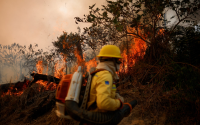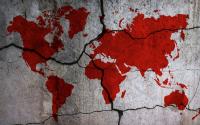Znet
A number of folks feel that current events -- particularly in the last few days -- have dramatically changed the logic and morality of what has been done in Afghanistan, calling into question much of the analysis and assessment that has been offered by critics of the war. Here are some of the questions we have been asked, and our brief replies.
1. You have expressed skepticism that Osama bin Laden was involved in the Sept. 11 attacks. Are you still skeptical?
Actually, what we and other advocates of democratic judicial values argued was not bin Laden's innocence, but that evidence regarding his involvement was not presented. On November 14 -- more than five weeks after the bombing began -- British Prime Minister Tony Blair declared that the evidence "now leaves no doubt whatever" that bin Laden was responsible. But isn't the evidence supposed to precede, not follow, the punishment? In any event, however, Blair's evidence even at this point is not decisive -- the only real addition to Blair's earlier dossier are quotes from an unpublicized bin Laden video -- that Britain doesn't have a copy of, but has knowledge of, reports the Los Angeles Times (15 Nov. 2001) -- that are not given in context and fall short of an admission. Bin Laden's guilt seems very likely, but the point is not to convince Blair or one allied government or another or even us, but public opinion in the Muslim world. Despite Washington's initial promise to present evidence publicly, it has yet to do so.
Not only did we never dispute the possibility that bin Laden was involved in some way, we instead offered an explanation of why he might very well have been involved, what he was seeking, etc. We suggested that his motive, were he responsible, was probably to draw the U.S. into a massive response, destabilizing the region, a result that still may occur.
More to the intent of the question, if, when a vigilante mob tries to lynch someone, it turns out that their suspect actually was guilty, that doesn't make the mob's actions any less vigilante. And this is true even if the mob doesn't kill a great many people (mostly victims, not culprits) in the process of going after their suspect, as has been occurring in Afghanistan.
2. Critics of the war have warned about mass starvation, genocide, and catastrophe. Weren't these warnings exaggerated?
No. Opponents of U.S. policy, ourselves included, indicated that human rights and aid organizations warned that the bombing could lead to a million or even millions of deaths. And we pointed out that ignoring this warning, regardless of whether the horror came to pass or not, was an absolutely devastating commentary upon our ruling and media elites, and on others as well. That remains exactly the case. We also urged that it was a priority to pressure the U.S. to stop the bombing, stop the war, and aid in averting this catastrophe. That is still the priority, in fact.
As to what damage has already been done, no one knows. What has happened, for example, to the large fraction of the population that has fled to the heavily-mined countryside? And many harmful consequences of U.S. policy will not be felt until later. What will be the future effects, for example, of losses in grain planting that was disrupted in October? When eyes turn away, who will be there to assess it?
That a country embarks on a policy that puts a million or more innocent civilians at risk for political purposes is mass-scale terrorism. If -- and it remains a big if, regrettably -- the catastrophe is averted that will certainly be a reason to celebrate, but it will not be not reason to laud those who aggravated the prospects of disaster in the first place. Playing Russian Roulette is stupid -- even if you don't end up blowing your head off. Shooting a gun with a bullet in a random chamber at someone else is immoral, whether or not you end up committing murder.
At the current time prospects are still very unclear. Yes, the U.S. could cease hostilities and assist food distribution, thereby reducing the prospect of catastrophic starvation. But the U.S. seems intent on rejecting any military let-up, and any pressure we can bring to bear urging this course of action is no less a priority now than it was yesterday or last week. Aid agencies warned that the crucial factor was how much food could be gotten in place before the winter snows and that the bombing interfered with getting the food in. Whether enough time now remains and whether the necessary effort is made before the snow arrives remains the critical question.
3. Some have been critical of the U.S. food drops. But weren't these helpful until the war provided a means to get food in by land?
No. The food drops were pure PR, perhaps doing more harm than good. And while left critics of the war certainly argued this, they did so by quoting the World Food Program, the Red Cross, and others aid agencies, and even the Financial Times, all of whom issued scathing denunciations of this propaganda tool. Nothing has changed about that. What has now occurred is that the Northern Alliance has occupied Kabul, and what’s left of the Taliban has retreated, it appears, to the mountains, virtually without a fight, under the weight of the most powerful non-nuclear bombs ever created, perhaps with the intention of waging an ongoing guerilla war from outside the main cities.
The end to major fighting in the north may well have welcome humanitarian consequences. But what does that lead us to conclude about the morality of U.S. actions? Suppose the Taliban were to release, tomorrow, a proclamation declaring "we left the cities for the mountains so that the bombing would halt -- not having us as a target -- and the way would be clear for food aid to get to our fellow citizens. We have sacrificed our hold on power, to avert starvation among our people."
Would we take that seriously? It would be true that their having left the field of battle created the conditions mentioned in the question. It would be true that it was a choice on their part, and that they could have instead fought on, leading into the winter, etc. Nevertheless, we would deduce based on our knowledge of their past policies that they made the choice out of their own strategic concerns, not out of concern for those suffering hunger. When the U.S. claims to care about the Afghan poor, we should not relinquish our critical faculties, just as we wouldn't were the Taliban to make the claim.
Note, incidentally, that it was not the case that U.S. planners "knew" they could force the Taliban out of the northern cities before winter. Every indication suggests that the Taliban retreat was as much a surprise to the Pentagon as to everyone else. Just two days ago Secretary of Defense Rumsfeld was warning that though victory wouldn't take years, it would take months (which, he observed, meant that he had 23 months in which to operate).
4. Do you still think we're targeting civilians in our bombing?
We never thought or stated that the bombing was targeting civilians per se. We did say that the direct violent affects on civilians were predictable. U.S. military planners know how often their smart bombs, not to mention their dumb bombs, miss, and how often their cluster bombs fail to detonate, thereby spewing future death traps across the land.
But the real issue, from the beginning, was not the hundreds of civilians killed by bombs, horrible as that is, but the tens or hundreds of thousands, or maybe more, who might succumb quietly out of camera range. Some will be victims of the destruction of what little civilian infrastructure there is in the country: for example, electrical transmission from the power station at the Kajaki Dam has been knocked out, creating (according to UN officials) the risk of massive flooding and crop failures (Independent, 8 Nov. 2001). Some will be driven into the landmine-infested countryside. But the potentially most disastrous effect of the bombing -- as we always maintained, and as various aid agencies have warned -- has been to put huge numbers of people at risk of starvation. And this remains the case. And we said that the latter was the most abominably heinous aspect of the project -- beyond that it was undertaken outside the law, indeed specifically to delegitimate the law, and to maintain military credibility, and to propel a "war on terrorism" whose purpose to no small degree is to organize domestic fear in pursuit of elite agendas of financial redistribution from poor to rich and draconian social reaction against civil liberties.
5. There's been lots of criticism of the Northern Alliance. But haven't they proven pretty effective?
Criticism of the Northern Alliance has been not that they are incompetent soldiers, but social monsters, slightly different in kind from the Taliban, but small improvement morally. Nothing in the past few days changes the historical record of the Northern Alliance, and indeed, the first sketchy reports of executions and looting in cities newly fallen under their control suggests that their thuggish practices continue. As RAWA, perhaps the foremost organization fighting for the rights of women in Afghanistan, announced as the Northern Alliance entered Kabul, "The retreat of the terrorist Taliban from Kabul is a positive development, but the entering of the rapist and looter Northern Alliance in the city is nothing but dreadful and shocking news for about 2 million residents of Kabul whose wounds of the years 1992-96 have not healed yet. Thousands of people who fled Kabul during the past two months were saying that they feared coming to power of the NA in Kabul much more than being scared by the US bombing."
Moreover, while they are no doubt capable warriors, what has occurred has little or perhaps even nothing to do with their battlefield abilities, since there was no battle. The Taliban essentially withdrew without a fight, apparently choosing to cede the cities to continue the struggle from the mountains, depending on how much there is left to them, under the onslaught of the bombing.
6. Since the anthrax probably has a domestic source and since the crash of American Airlines Flight 587 probably was accidental, don't your concerns about creating more terrorists seem a little alarmist?
Not at all -- unfortunately -- since people who are newly pushed to desperation by current policies, by the starvation, by the other continuing policies in the region, all now highlighted and aggravated, do not overnight manifest their commitment via terrorist attack, of course. The assessment of this miserable and depressing prediction against actual outcomes is in the future, not the present. It is not unlike when critics warned back in the 1980s that supporting bin Laden and the Mujahideen would have horrible future blowback ramifications. To say a week or two, or even a year or two after that prediction that it was proved false would have been a bit premature, obviously.
7. And your worries about uprisings throughout the Arab and Muslim worlds (including nuclear-armed Pakistan) -- weren't these too rather exaggerated?
We and other critics said that the policies undertaken in Afghanistan and proposed for the rest of the world risked such destabilization. They did, and they still do. Does anyone think that Pakistan's stability is assured as the battle moves to the southern Pashtun region of Afghanistan, a region with many cross-border ties to Pakistan? And if the U.S. decides to expand the "war on terrorism" to some new defenseless venue, say the Sudan, or perhaps a not entirely defenseless venue, say Iraq, the prospects of general social dissolution in the region will enlarge, again.
Numerous surveys in Arab and Muslim nations show extremely high levels of opposition to the U.S. war, even in supposedly friendly states. Most people are not inclined to heed bin Laden's call to holy war, but as the U.S. pushes its dictatorial allies to join Washington's holy war, instability is likely to spread.
8. Isn't it time to celebrate the demise of the Taliban and return to healing our country, setting aside all the negative talk about U.S. criminality, and all the opposition to U.S. policies?
If the Taliban were finished as a social force, that would be something worth "celebrating" in that the Taliban is a horrendously reactionary and violent organization impeding justice by its very existence and practices. But, regrettably, it is quite possible that they are off planning their next actions, not disintegrating.
As to setting aside criticisms of the U.S., nothing could be less constructive.
First, to continue to criticize and more importantly raise dissent to pressure an end to bombing and undertaking food aid in all endangered regions is paramount. The alternative is too horrible to even entertain.
Second, addressing the just grievances of people throughout the Middle East and the world regarding U.S. foreign policies is necessary both on behalf of those who suffer the impact of those policies, and also to eliminate the cause of support for terrorism against the U.S.
And third, the events in NYC, Washington, and Afghanistan, we are told by our government, auger a larger project, a war on terrorism, whose character, as we can already see, is to be quite like that of the Cold War. It will, if it actually transpires as intended, marshal hate and fear through manipulation and misrepresentation into support for policies that further enrich and empower the already rich and powerful. Everyone, at some level, knows this. The average American is not surprised that corporations and the government seek to use fear of terror to redistribute funds upward by means of regressive tax reforms and boondoggle military spending, to gut public programs, to stifle public debate by calls for patriotism from the media, and to restrict rights by draconian legislation. But not as commonly understood is that active dissent can curb these trends and can foster opposite ones on behalf of the poor, of those who work, and of those who need civil liberties. And dissenters continuing to dissent and to make known the power of dissent, are thus absolutely essential, in this, now as at any other time.
Michael Albert & Stephen R. Shalom






